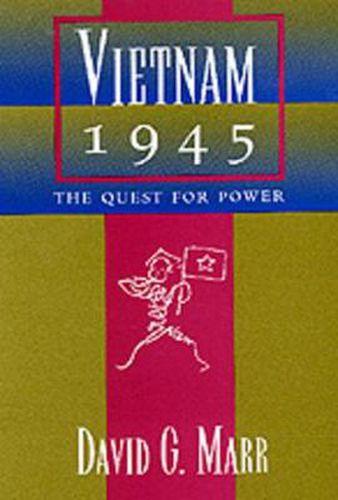Readings Newsletter
Become a Readings Member to make your shopping experience even easier.
Sign in or sign up for free!
You’re not far away from qualifying for FREE standard shipping within Australia
You’ve qualified for FREE standard shipping within Australia
The cart is loading…






1945: the most significant year in the modern history of Vietnam. One thousand years of dynastic politics and monarchist ideology came to an end. Eight decades of French rule lay shattered. Five years of Japanese military occupation ceased. Allied leaders determined that Chinese troops in the north of Indochina and British troops in the South would receive the Japanese surrender. Ho Chi Minh proclaimed the Democratic Republic of Vietnam, with himself as president.
Drawing on extensive archival research, interviews, and an examination of published memoirs and documents, David G. Marr has written a richly detailed and descriptive analysis of this crucial moment in Vietnamese history. He shows how Vietnam became a vortex of intense international and domestic competition for power, and how actions in Washington and Paris, as well as Saigon, Hanoi, and Ho Chi Minh’s mountain headquarters, interacted and clashed, often with surprising results. Marr’s book probes the ways in which war and revolution sustain each other, tracing a process that will interest political scientists and sociologists as well as historians and Southeast Asia specialists.
$9.00 standard shipping within Australia
FREE standard shipping within Australia for orders over $100.00
Express & International shipping calculated at checkout
1945: the most significant year in the modern history of Vietnam. One thousand years of dynastic politics and monarchist ideology came to an end. Eight decades of French rule lay shattered. Five years of Japanese military occupation ceased. Allied leaders determined that Chinese troops in the north of Indochina and British troops in the South would receive the Japanese surrender. Ho Chi Minh proclaimed the Democratic Republic of Vietnam, with himself as president.
Drawing on extensive archival research, interviews, and an examination of published memoirs and documents, David G. Marr has written a richly detailed and descriptive analysis of this crucial moment in Vietnamese history. He shows how Vietnam became a vortex of intense international and domestic competition for power, and how actions in Washington and Paris, as well as Saigon, Hanoi, and Ho Chi Minh’s mountain headquarters, interacted and clashed, often with surprising results. Marr’s book probes the ways in which war and revolution sustain each other, tracing a process that will interest political scientists and sociologists as well as historians and Southeast Asia specialists.